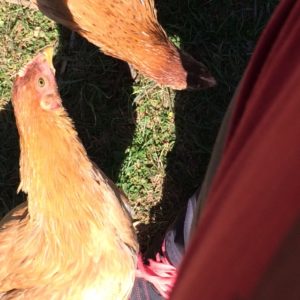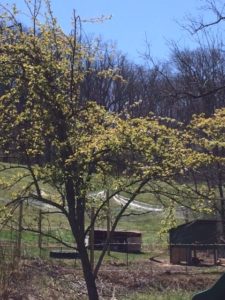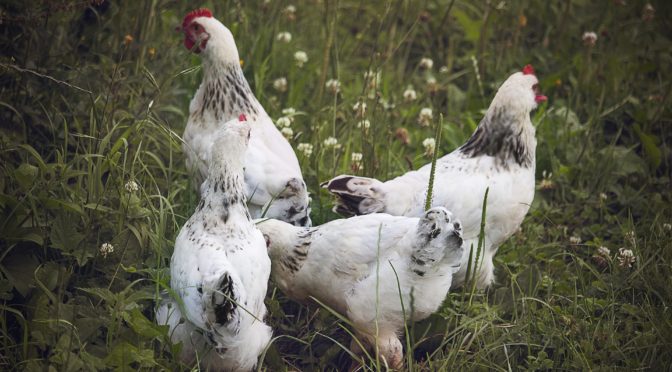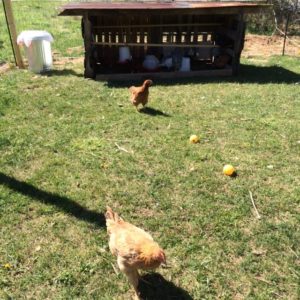This is part of the on-going series on Food Musings written by award-winning poet and writer, Julie Fisher. She is also the founder of Litmore, Baltimore’s Center for the Literary Arts.
***
“The industrial mind is a mind without compunction; it simply accepts that people, ultimately, will be treated as things and that things, ultimately will be treated as garbage.” Wendell Berry
These Musings are a reflection of my amateur farming experiences and research which intertwine with waxing poetic about the genuine pleasures of cooking, growing, harvesting, and sharing food. Our relationship to food is a biological imperative first, of course. But I believe the evolution of our food science and artistry is also an ingredient of our humanity. The good, generous, and delightfully curious part of all of us.
How we eat is no longer dependent strictly on what we can hunt or gather. It’s become this incredibly complex soup of choices and emotions and evocative memories and politics and class and income and marketing and industry. We no longer eat just to survive. Our daily lives are consumed by food and eating. We order our schedules and plans around food- shopping, preparation, and clean up. Food is a part of ritual. Food is so closely intertwined with our memories as to be inseparable. We remember the cooking smells of growing up, the scents of certain foods linked to great experiences, there’s the association of food eaten during an illness or particularly rough time. We are as fervent about food and eating as we are about religion and politics and sports. Our emotions and intensities cannot be separated from what we eat.
Some of us are fortunate and were taught to treat food mindfully and with a reverence for the ordinary. Some of us have such a helter skelter relationship to food we find ourselves with addictions and other harmful eating habits. Most of us fall in the middle. We don’t take food for granted, but we like convenience and ease of preparation. We are aware there are nutritious food choices and comfort food choices – and we tend to teeter between the two. As modern lifestyles evolve, we spend huge chunks of time away from home and we overschedule our time. This feeling of time scarcity makes us so susceptible to food impulses. As citizens of modern civilization, we are also recklessly bombarded with food marketing. We are consistently taunted by food AND food like substances.
 As farmers, our food choices are simplified. We eat what we’ve grown or managed to stock up on, freeze, or jar. We only get taunted by the food industry when we are out and about, like when we are shopping for what we can’t grow or we didn’t pack snacks to bring along and we’re starving. I’m so grateful for this simplicity, because we spend less money on conglomerates and we eat nutritious food.
As farmers, our food choices are simplified. We eat what we’ve grown or managed to stock up on, freeze, or jar. We only get taunted by the food industry when we are out and about, like when we are shopping for what we can’t grow or we didn’t pack snacks to bring along and we’re starving. I’m so grateful for this simplicity, because we spend less money on conglomerates and we eat nutritious food.
But farming has attuned our minds another way too-food is no longer an abstract list of purchases. Food becomes not just a thing but an interlocking process. Food is not just a jaunt to the store or market to get onions but a continuity. It’s also not a process with a beginning and end. Of course we plant, grow, and harvest onions but the harvest is not the “end.” There is no concrete end to the process because a) once you grow onions you will want to continue to grow onions, and b) the ability to grow onions doesn’t happen in a vacuum. Growing onions requires un-polluted, nutrient dense soil. Growing onions also requires sunlight, and non polluted rain water and good drainage and few predatory insects and a watchful eye on potential blights.
Nutrient dense soil is acheived with the right mix of compost and manure. Compost and manure don’t arrive magically, but through a fantastic, reciprocal energy exchange between animals, dead matter and decomposition. The result is beautiful, dark, rich soil full of complex nutrients, beneficial bacteria and good microorganisms. Nothing is wasted, there’s no garbage because a millenial old natural cycle is maintained.
AND we are intrinsically included in this natural cycle as labor and as consumers. We aren’t an anonymous cog in an assembly line wheel. We see and eat the fruits of our labor.
 Since we are learning from scratch to be farmers, we’ve had to make a significant choice early in our farming goals and decisions.
Since we are learning from scratch to be farmers, we’ve had to make a significant choice early in our farming goals and decisions.
The decision was whether we would go into food production or farming. That seems at first glance to be a semantic choice, but any, even brief, research into food growing advice uncovers the duality of food production or farming. One method is heavily mechanized, reliant on machinery and man made chemicals. The other is small scale and labor intensive. We chose the latter. Part of the decision was pragmatic. We didn’t want to go into heavy debt. We aren’t borrowing money to buy equipment we can’t afford, much less maintain. One part of the decision was impulsive. We prefer the sensation of our hands in soil and the “normal” sounds of outside like birdsong and creek burble over the constant sound of large tractor engines.
Before WWII, it was simply farming. but its not simple now. The military/industrial complex learned large scale food production ccould use up the stores of unused munitions chemicals. Farming “science” spread and convinced farmers that bigger is better and more profitable. I don’t begrudge farmers who had their eyes on a comfortable, future living. But as it turns out, what seems to be too good to be true is mega-agriculture/factory farming.
Wendell Berry is a writer and farmer who I respect immensely. His writing has been instrumental in clarifying my goals as someone who grows food and raises animals. I am currently re-reading Bringing It To The Table, Wendell Berry On Farming and Food, and I’d like to share this excerpt that somewhat sums up our aim…
“Husbandry pertains first to the household; it connects the farm to the household. It is an art wedded to the art of housewifery. To husband is to use with care, to keep, to save, to make last, to conserve. Old usage tells us that there is a husbandry also of the land, of the soil, of the domestic plants and animals-obviously because of the importance of these things to the household. And there have been times, one of which is now, when some people have tried to practice a proper human husbandry of the nondomestic creatures in recognition of the dependence of our households and domesti life upon the wild world. Husbandry is the name of all the practices that sustain life by connecting us conservingly to our places and our world; it is the art of keeping tied all the strands in the living network that sustains us.
And so it appears that most and perhaps all of industrial agriculture’s manifest failures are the result of an attempt to make the land produce without husbandry. The attempt to remake agriculture as a science and an industry has excluded from it the age-old husbandry that was central and essential to it, and that denoted always the fundamental domestic connections and demanded a restorative care in the use of the land and it creatures.”
We practice husbandry at Hateful Acres.
There are infinite uses for cooking with vegetable stock. AND you can use the “scraps” from vegetables you use in other dishes.
Take any vegetable scraps you have around – carrot peelings, onion skins, celery ends and leaves, etc. If you think ahead, freeze these as you get them, and then just pull them out of the freezer when you make stock.
Cook the scraps with a little bit of your favorite oil – just until soft. Then add water (how much you add depends on the quantity of your vegetable scraps), and simmer gently for an hour. Cool, strain, and use. Freeze extras!




